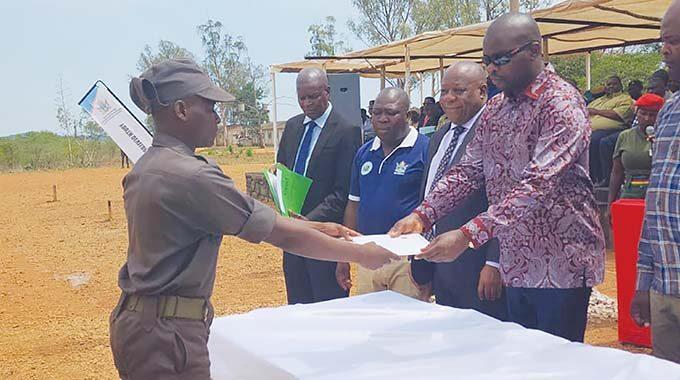News / National
831 graduate from rebranded Border Gezi program
10 Dec 2024 at 06:45hrs |
0 Views

A historic milestone was achieved as 831 young Zimbabweans graduated from the rebranded Dadaya National Youth Service training centre in Zvishavane, marking the inaugural graduation ceremony of the revamped Youth Service in Zimbabwe.
This programme, reintroduced under the leadership of President Mnangagwa, aims to develop patriotic, disciplined, and resilient youth equipped with skills essential for nation-building.
The National Youth Service programme was originally launched in 2001 following recommendations from the Nziramasanga Commission Report of 1999. Over 83,000 youths participated in the programme before it was discontinued due to financial constraints.
Minister of Youth Empowerment, Development, and Vocational Training, Tino Machakaire, highlighted the significance of this new chapter in youth development. Addressing the graduates, including 140 females and 691 males, Minister Machakaire stated:
"Young people are full of energy, motivation, and new ideas critical for national development. They, however, require guidance to channel their energy toward progressive paths. This programme positions the youth as catalysts for social change and nation-building."
This year alone, 1,082 trainees graduated from the Dadaya and Vumba training centres, following the programme's launch on May 24 at Nhakiwa Vocational Training Centre in Mashonaland East Province.
The Youth Service in Zimbabwe provides a broad curriculum aimed at holistic development. Trainees undergo national orientation, learning about the country's history, liberation struggle legacy, and civic education. The curriculum also covers: Environmental management. Personal and community health practices. Entrepreneurship and livelihoods. Disaster management. Drug and substance abuse education. Basic ICT skills.
The programme's emphasis on addressing drug and substance abuse is yielding positive results, with most trainees who had substance use issues reportedly recovering during their time at Dadaya.
Graduates are already being absorbed into key national institutions, reflecting the programme's value in workforce development. Among the graduates: Four were recruited by the Zimbabwe Republic Police (ZRP). Four joined the Zimbabwe National Army. Ten were absorbed by Zvishavane Town Council. Others were taken in by Zimpapers and the Public Service Commission
Minister Machakaire noted that the Cabinet has directed all State institutions, higher education bodies, and public enterprises to give priority to holders of the Youth Service in Zimbabwe certificate.
Currently, the programme operates at three centres in Midlands, Manicaland, and Matabeleland South, with plans to extend to seven more provinces. Next year, training is expected to begin at Guyu Training Centre in Gwanda and Igava Training Centre in Marondera.
As the nation seeks to address challenges such as drug abuse and unemployment among the youth, the rebranded Youth Service programme is poised to play a pivotal role in empowering young people and fostering national development.
This programme, reintroduced under the leadership of President Mnangagwa, aims to develop patriotic, disciplined, and resilient youth equipped with skills essential for nation-building.
The National Youth Service programme was originally launched in 2001 following recommendations from the Nziramasanga Commission Report of 1999. Over 83,000 youths participated in the programme before it was discontinued due to financial constraints.
Minister of Youth Empowerment, Development, and Vocational Training, Tino Machakaire, highlighted the significance of this new chapter in youth development. Addressing the graduates, including 140 females and 691 males, Minister Machakaire stated:
"Young people are full of energy, motivation, and new ideas critical for national development. They, however, require guidance to channel their energy toward progressive paths. This programme positions the youth as catalysts for social change and nation-building."
This year alone, 1,082 trainees graduated from the Dadaya and Vumba training centres, following the programme's launch on May 24 at Nhakiwa Vocational Training Centre in Mashonaland East Province.
The Youth Service in Zimbabwe provides a broad curriculum aimed at holistic development. Trainees undergo national orientation, learning about the country's history, liberation struggle legacy, and civic education. The curriculum also covers: Environmental management. Personal and community health practices. Entrepreneurship and livelihoods. Disaster management. Drug and substance abuse education. Basic ICT skills.
The programme's emphasis on addressing drug and substance abuse is yielding positive results, with most trainees who had substance use issues reportedly recovering during their time at Dadaya.
Graduates are already being absorbed into key national institutions, reflecting the programme's value in workforce development. Among the graduates: Four were recruited by the Zimbabwe Republic Police (ZRP). Four joined the Zimbabwe National Army. Ten were absorbed by Zvishavane Town Council. Others were taken in by Zimpapers and the Public Service Commission
Minister Machakaire noted that the Cabinet has directed all State institutions, higher education bodies, and public enterprises to give priority to holders of the Youth Service in Zimbabwe certificate.
Currently, the programme operates at three centres in Midlands, Manicaland, and Matabeleland South, with plans to extend to seven more provinces. Next year, training is expected to begin at Guyu Training Centre in Gwanda and Igava Training Centre in Marondera.
As the nation seeks to address challenges such as drug abuse and unemployment among the youth, the rebranded Youth Service programme is poised to play a pivotal role in empowering young people and fostering national development.
Source - The Chronicle
Join the discussion
Loading comments…


































